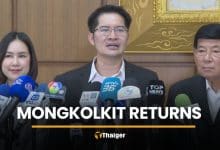Burkina Faso: Justice for Thomas Sankara

Justin Sogbedji looked up in awe at the 5-meter tall statue of Thomas Sankara. Erected last year in Burkina Faso’s capital, Ouagadougou, the impressive monument attracts thousands of visitors every month. Sogbedji can’t seem to get enough pictures with Sankara’s statue.
“Thomas Sankara is a fighter. Ever since my childhood, I liked what he did,” said Sogbedji, who moved to Burkina Faso from neighboring Benin three years ago. Now he can visit the statue and memorial to his hero in peace.
“He fought so much for Burkina Faso. It’s amazing.”
Sankara, who came to power in Burkina Faso — then called Upper Volta — after a coup on August 4, 1983, has been a hot topic in Ouagadougou for days. On Monday, a historic trial will finally begin to shed light on how he and 12 other military officers were killed on October 15, 1987.
Jean-Hubert Bazie, a retired journalist, and the communications officer for the Thomas Sankara Memorial, is also eagerly awaiting the trial. “We hope the truth sees the light of day,” he said.
Place of execution
The truth is tightly bound to the location of the statue, which, together with a tower should become the center piece of a future park covering almost 10,000 square meters. Bazie walks along a path towards two houses. One served as the headquarters for the National Revolutionary Council (CNR), which catapulted Sankara to power.
“Look at the one on the left. Thomas Sankara and twelve comrades were executed there,” Bazie says.
A large portrait and a wreath of plastic flowers commemorate the scene of the execution. On that Thursday, Sankara – then 38 years old – met here with members of his cabinet to discuss the founding of a political party. Suddenly, gunshots rang out outside. As the men tried to escaped the building, they were gunned down. Only one, Alouna Traoré, survived.
The main defendant in the trial is Blaise Compaoré, Sankara’s former companion and eventual president of Burkina Faso. Compaoré, now 70, remained president until his resignation on October 31, 2014.
After leaving office, Compaore went into exile in the Ivory Coast, becoming an Ivorian citizen in 2016. Nobody expects him to attend the trial. His lawyers say he has not been summoned for questioning. As a former head of state, he also enjoys immunity. But Bazie believes Compoare has simply wanted to avoid accountability for Sankara’s death for decades.
“Sankara’s father always said he’s waiting Compaore to pay him a visit and tell him exactly what happened that day. He’s long dead now. But Compaore never made that visit.”
Benefitting young people
In the Ouagadougou suburb of Wayalghin, where the citizen rights movement Balai Citoyen is headquartered, the trial is eagerly anticipated.
“It would be better of course if Compaore were here to face the justice system of his country,” said Eric Ismael Kinda, spokesperson for Balair Citoyen, on Compaore’s absence.
“He fled and has no trust in the system he is largely responsible for.”
That the trial is taking place at all is mostly thanks to Burkinabe civil society, believes Canada-based political scientist Aziz Salmone Fall, who coordinates the international Justice for Thomas Sankara campaign.
“The younger generation, that Sankara never knew, overthrew Compaore’s regime,” he said.
Weeks of demonstrations in October 2014 toppled Compaore’s rule, and forced him to step down. Under the transitional government of Michel Kafando, Sankara’s body was exhumed and the government launched an investigation. Among other things, a military doctor certified that the body was “riddled with bullets.” Previously, Sankara was said to have died of “natural causes.”
French role
Fall does not want to participate in the trial in protest of Compaore’s no-show. But he also believes the role of France, Burkina Faso’s former colonial power, needs to be fully investigated. Only in 2017 did President Emmanuel Macron declassify all French documents regarding the death of Sankara.
“I don’t think it was merely a locally conceived plot. It was international. The last revolution on the African continent ended with Sankara’s death,” said Fall.
Sankara, whose vision for Burkina Faso included the country producing its own goods locally and becoming self-reliant — and until this day is revered for his modesty by admirers — was a thorn in the side for many who did not want to see an independent African state succeed.
In Ouagadougou, Sankara is still a hero for young people.
“He fought against the forces that undermine society, like corruption, injustice, unemployment, illiteracy, poverty. We know the youth are particularly hit by poverty,” said Balai Citoyen’s Kinda.
But that’s not all: Since Sankara’s death, has any politician in Burkina Faso, or even Africa, come close to the heroic aura quite like Sankara?
Back at the memorial to Thomas Sankara, Justin Sogbedji thinks long and hard before answering, “No, I haven’t seen anyone like him yet.”
SOURCE: DW News
Latest Thailand News
Follow The Thaiger on Google News:


























